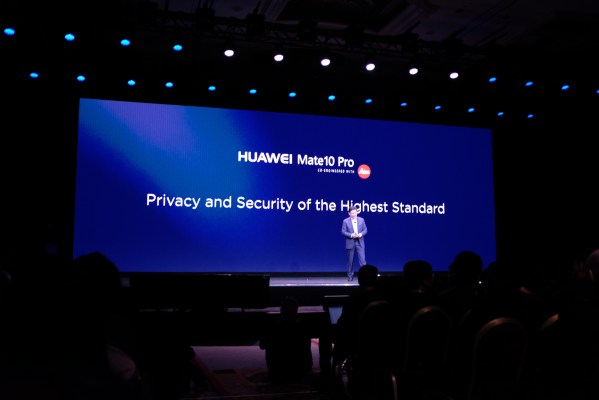It was the 800-pound gorilla for the duration of today’s Huawei CES keynote — a sort of will he, or won’t he? Richard Yu managed to keep his cool for the majority of the event, announcing the unlocked availability of the company’s latest flagship here in the States, talking up a new Wi-Fi router system and introducing Wonder Woman as the company’s new spokesperson.
A day earlier, however, reports broke that AT&T had pulled out of a deal with Huawei, leaving the smartphone maker in a rough spot, just ahead of its big show. This was going to be the company’s moment of triumph, finally cracking the U.S. market, after years of struggle.
Yu maintained a poker face, breaking slightly roughly halfway through the presentation to cite the company’s “highest standard in privacy and security” in a raised voiced close to shouting, as the audience smattered applause in response.
If I was a betting man, I’d have put money on the executive not pushing the matter any further. These things are seldom discussed in the context of an event like this. More than likely, Yu would simply mention the handset’s unlocked price, end the conference and leave us all to run to the nearest hardwired internet connection to upload our hot takes.
But as the keynote closed, things took a weird turn. Yu’s tone and demeanor shifted noticeably. “You may have seen some news reports,” the executive told the audience, knowing full well that everyone in the audience almost certainly had.
Back in December, Yu told the Associate Press, “We will sell our flagship phone, our product, in the U.S. market through carriers next year. I think that we can bring value to the carriers and to consumers. Better product, better innovation, better user experience.”
Now he told the audience, “unfortunately at this time we cannot.” Yu appeared to put the blame at the feet of the U.S. carriers, adding, “it’s a big loss for consumers, because they don’t have the best choice for devices.”
Yu uttered the word “trust” in quick succession — three times in around a minute — during the keynote. It all seemingly stemmed back to distrust of Huawei and fellow Chinese companies spelled out by the report from the House Intelligence Committee in 2012, which cited both Huawei and fellow Chinese smartphone maker ZTE as potential security risks.
“Private-sector entities in the United States are strongly encouraged to consider the long-term security risks associated with doing business with either ZTE or Huawei for equipment or services,” according to the report.
The U.S. is something of an outlier on this one. Huawei’s brand recognition is far stronger outside the States. In fact, the company currently commands the third largest international market share, behind Apple and Samsung. “We’ve won the trust of the Chinese carriers,” Yu told the crowd. “We’ve also won spots on all of the European carriers.”
Carrier deals are especially key here in the States. The sales paradigm has shifted somewhat, but a majority of smartphones in the U.S. are purchased through carriers. It’s a tough cycle to break, with the upfront price of many flagships nearing the quadruple digits. Huawei has distribution with key retailers like Best Buy and Amazon, but the company ultimately won’t penetrate the market the way it hopes without that extra push.
Meanwhile, the company has been pumping money into advertising in an effort to establish its brand as a leading device manufacture. It’s begun playfully poking fun at the trouble Americans have pronouncing its name with the “Wow Way” campaign, and hired Gal Gadot, one of the world’s most charming human beings, in the role of “Chief Experience Officer.” But without carrier distribution, not even the entire Justice League will help the company overcome that obstacle.
